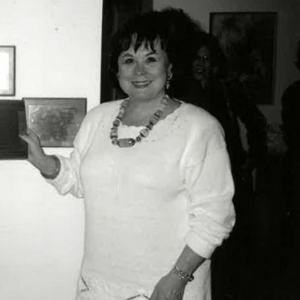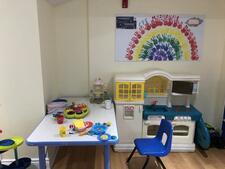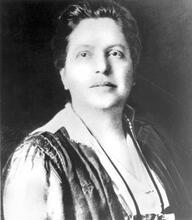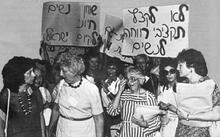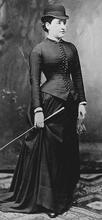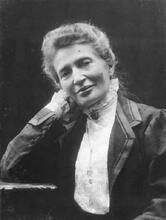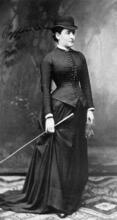Auberge Shalom Pour Femmes
Until relatively recently, many Jews believed domestic violence was rare in the Jewish community. Following the 1984 murder of a Montreal Jewish woman by her husband, Canadian Jews recognized the need for a Jewish shelter for victims of domestic abuse. Auberge Shalom pour femmes was established in Montreal in 1989, the first and only Jewish shelter for women in Canada and committed to observing all the necessary halakhic requirements. The organization opened an additional point of service in 2002, providing counselling and support through an external office. Auberge Shalom pour femmes continues to grow and accommodate the ever-changing complex needs and challenges facing women and children survivors of intimate partner abuse.
Background
In 1984, a Jewish woman named Donna Kertzer Rose from the West Island of Montreal was murdered by her husband. Her death shook the local Jewish community, with many finding it difficult to believe that domestic violence was even an issue for Jews.
Leaving an abusive situation is always complicated, but the difficulty increases for those who belong to marginalized communities. According to Barbra Harris, then the director of a Jewish shelter in the United States, Jewish women who sought help for domestic abuse were on average older than their non-Jewish counterparts. Her explanation for this difference: Jewish women “think people will think that something is wrong with Jews” (Montreal Gazette, 1997).
Fear of airing dirty laundry is not the only reason many Jewish women avoided seeking shelter when faced with intimate partner violence. Also important were the logistics. Observant Jewish families are bound by The legal corpus of Jewish laws and observances as prescribed in the Torah and interpreted by rabbinic authorities, beginning with those of the Mishnah and Talmud.halakhah (such as dietary restrictions or rules about the sabbath). A non-Jewish space was, for many observant women, an additional obstacle to their situation.
A Jewish shelter was the obvious solution, and the Montreal section of the National Council for Jewish Women, led by Miriam Charron, took up the cause. They knocked on doors, reached out to various organizations, consulted rabbinic authorities, and solicited donors. According to the Montreal Section of the National Council Bulletin, consultations were also held with Jewish Family Services, social workers, hospitals, and social services. The compiled statistics of the time “indicated that the problem was acute and [recommended] that the shelter project be started without delay” (Montreal Section of the National Council of Jewish Women of Canada Bulletin, Spring 1989).
Foundation
Auberge Shalom pour femmes was established in 1989, five years after Donna Kertzer Rose’s murder. Miriam Charron was its first president. The house in which the shelter was located was purchased by Leonard and Bina Ellen.
As the first and only Jewish shelter in Canada, Auberge Shalom pour femmes was committed to observing all the necessary halakhic requirements, providing its residents with a Term used for ritually untainted food according to the laws of Kashrut (Jewish dietary laws).kosher kitchen and a Sabbath-observing household. When it first opened its doors, the shelter had five bedrooms for women and their children, who could stay for up to six weeks at a time.
The Jewish nature of the shelter did not prevent it from receiving non-Jewish clientèle. Indeed, most of the women who have stayed at Auberge Shalom pour femmes over the years have not been Jewish.
The Montreal Context
A few months after Auberge Shalom pour femmes opened its doors, Montreal was struck by one of the most horrific femicides in recent North American history.
On December 6, 1989, a man walked into the école Polytechnique de Montréal, an engineering school affiliated with the Université de Montréal, armed with a gun. He stepped into a random classroom, told the men to leave, and massacred the women. He then rampaged through the hallways, yelling “I hate feminists” and killing the women he came across before killing himself.
Auberge Shalom pour femmes has consistently marked December 6 as a significant date of remembrance, revealing its relationship not just to the Jewish community but also to the city where it has its home. In 2022, for example, the organization released twelve videos about intimate partner violence—one each day, beginning on November 25 (the International Day of Violence against Women) and culminating on December 6, the day of the Polytechnique massacre.
Auberge Shalom is also explicitly bilingual, so both French- and English-speaking women in the city might feel comfortable seeking shelter there.
Evolution
Auberge Shalom pour femmes has evolved significantly over its 35-year history. It began as a small shelter with only five bedrooms, but by 2002 it had become an organization with an external counselling office that received calls and provided support for women and children not seeking immediate shelter. Over the years, this external office has become a vital point of entry for religious Jewish women. The idea for this office was spearheaded by the director at the time, Diane Sasson, who was later invested with the Order of Canada in 2018.
Auberge Shalom launched a children’s program in 2009, to attend more directly to the social and psychological needs of children. Moreover, each year since the shelter’s foundation sees more work done on outreach and educational programs. The organization has collaborated with schools, summer camps, synagogues, community groups, and health and social services, in the hopes of broadening the conversation around domestic abuse in the Jewish community.
Auberge Shalom pour femmes also extended its reach to the broader Quebec community, partnering with regional groups to address issues of domestic violence and joining advocacy efforts with the provincial network of shelters.
In 2013, the shelter moved to a larger, nine-bedroom, accessible home. Since moving to the new location, the average occupancy rate has been just over 100%. Due to the complexity of cases, the average length of stay has increased significantly since the shelter opened.
According to Auberge Shalom’s Communications Director, Laura MacDonald, in 2022-2023 eighty women and children stayed at the shelter, from 21 countries of origin, and staff answered over 1500 support calls. In addition, the external counselling office performed almost 1200 interventions and supported 130 women and children from 49 different countries of origin, including many Jewish clients. Auberge Shalom’s outreach and prevention efforts reached over 1000 people, including 600 youth (personal communication).
Because intimate partner violence is complex, with far-reaching consequences, the organization has generated resources for women beyond emergency care. It has developed a discretionary fund for clients in precarious situations, an Access to Justice program to help women navigate the legal system, a Milestone Fund to support women battling rising food costs, and an Education Fund that provides bursaries for women seeking long-term career goals.
National Council for Jewish Women of Canada, Montreal Section: Bulletin (Spring 1989).
Auberge Shalom pour femmes: 2022-2023 Impact Report.
Auberge Shalom pour femmes: 2023-2024 Impact Report.
Susan Schwartz, “Jewish and Native Women Will Have Shelters Next Year.” The Montreal Gazette (July 15, 1987).

